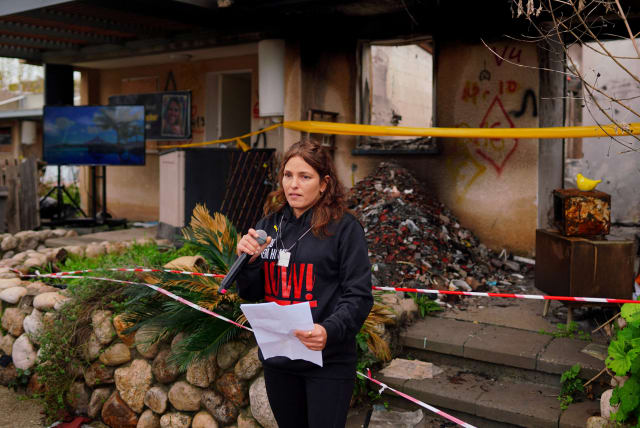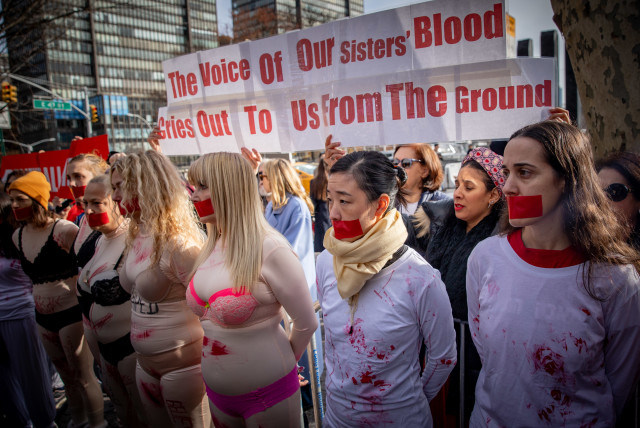Released hostage: 'I was forced to commit sexual acts with a gun pointed at me'

Trigger Warning: This story describes deeply disturbing events and testimonials in graphic detail.
Released Gaza hostage Amit Soussana gave her personal testimony of the sexual violence and physical abuse she endured in Hamas captivity in an eight-hour interview with The New York Times that was published on Tuesday. She is the first released hostage to give direct testimony of sexual atrocities committed by Hamas.
Soussana previously made headlines when a video surfaced of the moment of her capture, when she fought off seven Hamas terrorists before being brought to Gaza.
In the interview, Soussana recalled being held hostage in a child’s bedroom in Gaza with a chain attached to her left ankle. The Hamas terrorist in charge of guarding her, whom she named Muhammad, occasionally would sit beside her on the bed, lift her shirt, and grope her, she said.
Recently released hostage Amit Soussana's remarkable courage shines in a new video on N12. The footage vividly captures her brave stand against seven terrorists, as she adamantly refuses to be taken hostage. Read more: https://t.co/JjmY2ohHHZ pic.twitter.com/wVdimQETbj
— The Jerusalem Post (@Jerusalem_Post) December 5, 2023

Muhammad would constantly ask about her period, inquiring if she was bleeding, if she had washed herself since, and when it would end, she added.
Sometime around October 24, Muhammad forced her to commit a sex act on him, Soussana said.
On that morning, he unlocked the chain around her ankle so that she could wash herself in the bathtub, she said, adding that after she began, Muhammad returned with a pistol.
“He came toward me and shoved the gun at my forehead,” Soussana said.
Muhammad hit her repeatedly to force her to take her towel off. After she did, Muhammad groped her before continuing to hit her.
Afterward, he dragged her back to the child’s room at gunpoint. The room was covered in images of SpongeBob Squarepants, she said.
“Then, with the gun pointed at me, [he] forced me to commit a sexual act on him,” Soussana said. After it was over, Muhammad left the room to wash up and left Soussana naked in the dark.
When he returned, she said, he expressed remorse, telling her, “I’m bad. I’m bad. Please don’t tell Israel.”
Soussana also recounted her moral quandary of accepting food from her abuser.
“You can’t stand looking at him, but you have to,” she told the Times. “He’s the one who’s protecting you. He’s your guard. You’re there with him, and you know that at any moment it can happen again. You’re completely dependent on him.”
Soussana then discussed her second captor, Amir, after she was transferred to a different location. On the day that she arrived at the new apartment, the Hamas terrorists wrapped her head in a pink shirt, forced her onto the floor, handcuffed her, and beat her with the butt of a gun, she said.
Minutes after that, they suspended her “like a chicken on a stick, suspended between two couches.” She recalled that she felt that her hands would be dislocated due to the intensity of the pain.
While suspended, her new captors beat and kicked her, focusing on the soles of her feet while demanding information that she might have had about the enemy.
After that, she was untied and led to a new bedroom, where they told her she had 40 minutes to produce information or else they would kill her.
Reports of acts of sexual violence committed by Hamas have been told in second-hand accounts by women and girls who were freed in the hostage deal last November, but none have been as explicit as Soussana’s.
Many apologists have denied any reports of sexual violence committed by Hamas, saying if it took this long to bring the allegations to light, they could not be true. Sexual crimes do not always get reported, as the trauma suffered by the victims could take such a toll as to dissuade them from bringing the crimes to light, according to experts.
Many of the victims of Hamas’s sexual crimes either died in the October 7 massacre or are still held in captivity in Gaza.
Currently, there are still 19 women hostages or whose bodies are still held in Hamas captivity: Naama Levy, Shani Louk, Noa Argamani, Romi Gonen, Arbel Yehud, Carmel Gat, Eden Yerushalmi, Doron Steinbrecher, Maya Goren, Ofra Kedar, Inbar Haiman, Liri Albag, Daniella Gilboa, Shiri Bibas, Karina Ariev, Agam Berger, Emily Damari, Amit Esther Buskila, and Judy Weinstein.
Hamas spokesperson denies the New York Times report
Hamas spokesperson Basem Naim filed a 1,300-word response to The Times regarding Soussana’s testimony. He cast doubt on her allegations and demanded that the newspaper investigate them. He also said such an investigation would be impossible under “the current circumstances.”
Naim questioned why Soussana had not spoken out publicly about the extent of her abuse until now. The level of detail in her account makes it difficult to believe, “unless some security officers designed it,” he said.
Naim also discounted the possibility that Hamas members could carry out such an act because the human body is sacred to them.
“For us, the human body, and especially that of the woman, is sacred,” he said, adding that Hamas’s religious beliefs “forbade any mistreatment of any human being, regardless of his sex, religion, or ethnicity.”
Previous testimonies of rape committed by Hamas have been denied as well
This is not the first instance of denial of the sexual atrocities committed by Hamas. The UN secretary-general’s special representative on sexual violence in conflict, Pramila Patten, submitted a special report to the UN Security Council that said: “We found clear and convincing information that sexual violence, including rape, sexualized torture, and cruel, inhuman, and degrading treatment, has been committed against hostages, and we have reasonable grounds to believe that such violence may still be ongoing against those in captivity.”
The report was not classified as an investigation, and the UN Security Council met in mid-March to debate the findings. The report has also faced severe backlash and denial on social media.
In response to Soussana’s interview, President Isaac Herzog said in a post on X: “Amit Soussana speaks for all those who cannot speak. She speaks for all the victims of Hamas’s despicable sexual crimes and abuse. She speaks for all women everywhere.
“The whole world has the moral duty to stand with Amit – and all the victims – in condemning Hamas’s brutal terror and in demanding the immediate return of all the hostages.”
Amit Soussana speaks for all those who cannot speak. She speaks for all the victims of Hamas’ despicable sexual crimes and abuse. She speaks for all women everywhere.The whole world has the moral duty to stand with Amit - and all the victims - in condemning Hamas’s brutal…
— יצחק הרצוג Isaac Herzog (@Isaac_Herzog) March 26, 2024
Jerusalem Post Staff contributed to this report.
Jerusalem Post Store
`; document.getElementById("linkPremium").innerHTML = cont; var divWithLink = document.getElementById("premium-link"); if (divWithLink !== null && divWithLink !== 'undefined') { divWithLink.style.border = "solid 1px #cb0f3e"; divWithLink.style.textAlign = "center"; divWithLink.style.marginBottom = "15px"; divWithLink.style.marginTop = "15px"; divWithLink.style.width = "100%"; divWithLink.style.backgroundColor = "#122952"; divWithLink.style.color = "#ffffff"; divWithLink.style.lineHeight = "1.5"; } } (function (v, i) { });
